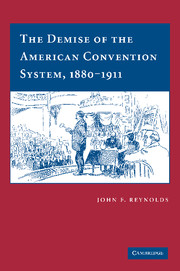Book contents
- Frontmatter
- Contents
- Acknowledgments
- Abbreviations
- The Demise of the American Convention System, 1880–1911
- 1 Introduction
- 2 The Search for Harmony: The Convention System in the Party Period
- 3 The Emergence of the Hustling Candidate
- 4 Coping with Competition: The Limitations of Party Self-Regulation
- 5 “The Pivot of Reform”: Debating the Direct Primary
- 6 The Direct Primary in the Reform Tradition
- Appendixes
- Bibliography
- Index
5 - “The Pivot of Reform”: Debating the Direct Primary
Published online by Cambridge University Press: 18 August 2009
- Frontmatter
- Contents
- Acknowledgments
- Abbreviations
- The Demise of the American Convention System, 1880–1911
- 1 Introduction
- 2 The Search for Harmony: The Convention System in the Party Period
- 3 The Emergence of the Hustling Candidate
- 4 Coping with Competition: The Limitations of Party Self-Regulation
- 5 “The Pivot of Reform”: Debating the Direct Primary
- 6 The Direct Primary in the Reform Tradition
- Appendixes
- Bibliography
- Index
Summary
For two days in January 1898 some fifty or so notable citizens gathered at New York's Board of Trade and Transportation to discuss various mechanisms for improving the nominating processes of the major parties. Many of those attending would play important roles in overhauling the election systems of their states in the years to come. George L. Record had already drafted the nation's first direct primary bill four years before, only to see it voted down in the New Jersey legislature. He and others viewed the first (and apparently last) “National Conference on Practical Reform of Primary Elections” as a watershed event. “As all of you know,” Record reminded the assembly, there had been “very little interest in primary reform, and it has been practically impossible to get anybody to pay any attention to it.” Yet, a change in the political climate seemed palpable. Four years of investigation and agitation on a variety of municipal issues had convinced the Chicago Civic Federation that “if any permanent reform were to be secured, it must be through the purification and utilization of the party primaries.” “The primary is the pivot of reform,” another delegate affirmed, and so it seemed for some years to come. Despite the obscurity that soon awaited it, the primary reform conference's claim to historical significance is not without merit. The conclave demarcated that point in time when an overhauling of the convention system became a cause célèbre for scholars, journalists, and partisan-minded legislators.
- Type
- Chapter
- Information
- The Demise of the American Convention System, 1880–1911 , pp. 158 - 200Publisher: Cambridge University PressPrint publication year: 2006



